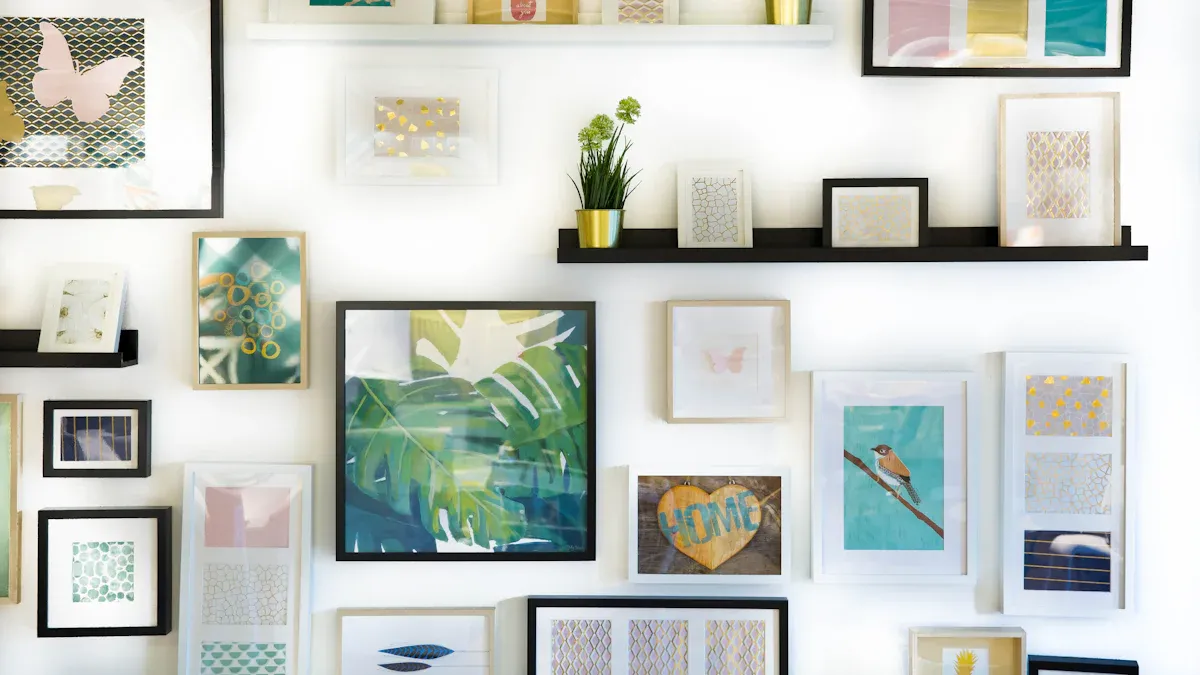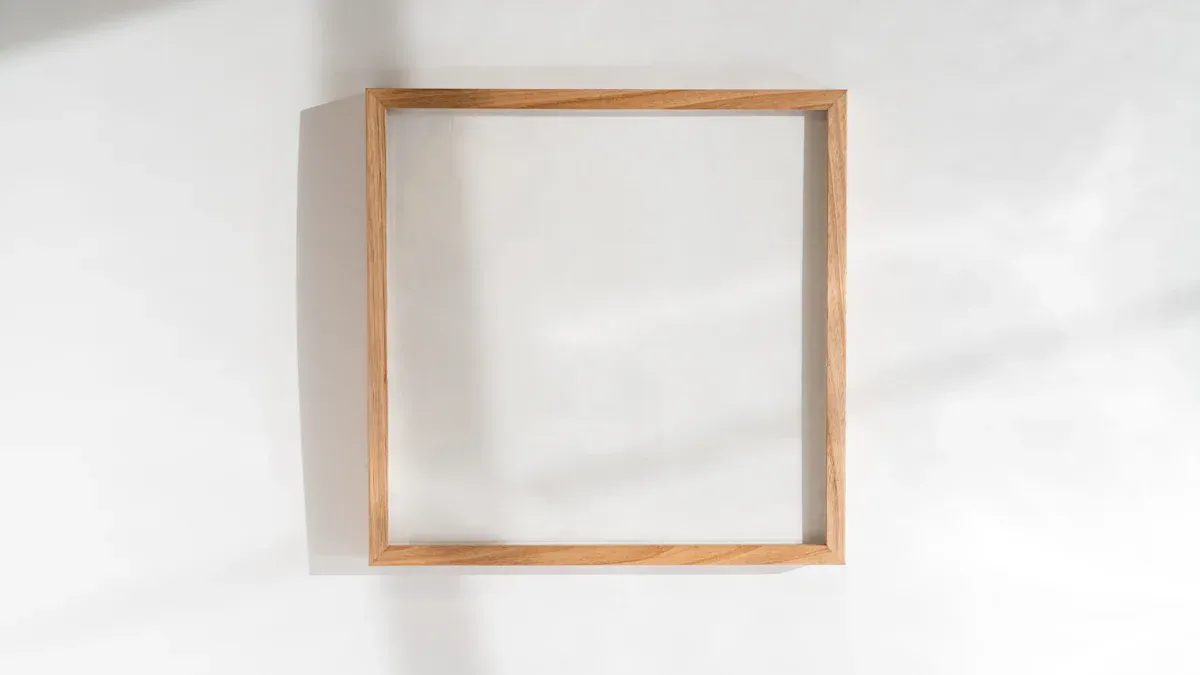Lighted Poster Frames Installation Guide for Residential and Commercial Spaces

You want your space to look special with bright pictures. Lighted poster frames help by using led technology and lightbox design for bold displays. These frames let you change posters easily and look modern. The led lightbox system gives even light and stays good for a long time. Pick lighted poster frames to make any place feel nicer. With good led lightbox frames, you get easy setup and they last a long time.
Key Takeaways
Pick a good spot and wall for your lighted poster frame. This helps you install it easily. It also makes the display bright without glare.
Use the right tools and hardware for your wall and frame weight. This keeps the frame safe and level on the wall.
Plug in the power adapter with care. Keep the cables neat so your display is safe and looks nice.
Test the frame after you put it up. Make sure the lighting is even. Change the brightness with the dimmer or remote for the best look.
Take care of your frame by cleaning it often. Check the electrical parts and change LED strips when needed. This keeps your display bright and working well.
Unpacking

Inspecting for Damage
When you receive your lighted poster frame, start by choosing a clean, well-lit area with a flat surface. This space helps you see every detail and keeps your frame safe from accidental scratches. Use a utility knife to cut the tape on the carton. Hold the knife at a shallow angle so you do not scratch the frame inside. Open the box slowly and carefully.
Take out each frame one at a time. This step prevents accidental drops or bumps. Place each frame gently on the flat surface. Now, inspect the frame right away. Look for cracks, dents, or scratches on the frame and the lighted panel. Check the corners and edges closely. If you see any damage, take clear photos. These photos help if you need to file an insurance claim or contact the supplier.
Tip: Always keep the original packaging until you finish the installation. The box protects the frame if you need to move it again.
Checking Parts
After you check for damage, make sure you have all the parts. Most lighted poster frames come with a checklist in the box. Lay out all the items on your flat surface. You should find the frame, mounting hardware, power adapter, and any hanging kits. Some frames include wall anchors or brackets for extra support.
Frame
Mounting hardware (screws, anchors)
Power adapter or cord
Hanging kit (for larger or heavier frames)
User manual or installation guide
If your frame arrived disassembled, follow the instructions to put it together before mounting. Double-check that all screws and connectors fit tightly. Missing or loose parts can affect the safety and look of your display. If you notice anything missing, contact the supplier before you start the installation.
Note: Store all small parts in a safe place until you are ready to install the frame. This step prevents loss and saves time during setup.
Preparation
Choosing Location
You want your lighted poster frame to stand out and draw attention. Start by picking the ideal location in your home or business. Look for a spot where people will see the display easily, such as entryways, hallways, or behind a reception desk. Make sure the area has enough wall space for the frame size you plan to use. The frame should not block switches or outlets.
Think about the lighting in the room. LED poster frames work best when you avoid direct sunlight or harsh overhead lights that can cause glare. Place the frame so the light beam centers on your artwork or poster. For the best effect, aim for a 30-degree angle to reduce reflections. If you use a plug-in frame, choose a spot near a power outlet for easy access.
Tip: Use a tape measure to check the height and width of your chosen spot. This step helps you avoid mistakes during installation.
Wall Type
Check the type of wall where you plan to install the frame. Most walls in homes and offices are drywall, but you may also find brick, concrete, or wood paneling. Each wall type needs different mounting hardware. Drywall usually needs anchors, while brick or concrete requires masonry screws. Wood walls often allow you to screw directly into the surface.
Drywall: Use wall anchors for secure mounting.
Brick/Concrete: Use masonry screws and a drill with a masonry bit.
Wood: Use wood screws for a strong hold.
Always match the hardware to your wall type to keep the frame safe and level.
Power Access
LED lighted poster frames need a reliable power source. Most models use corded electric power with an input voltage range of 110-240V and an output of DC 12V. Check if your chosen location has a nearby outlet. If not, you may need an extension cord or to hire an electrician for a new outlet. Some frames offer dimmable lighting with remote control, which adds flexibility.
Specification | Details |
|---|---|
Power Source | Corded Electric |
Input Voltage | 110-240 V |
Output Voltage | DC 12 V |
Power Consumption | 20 W |
Light Source | LED |
Dimmable | Yes (Remote) |
Note: Plan your cable management before installation. Hide cords behind furniture or use covers for a clean, professional look.
Tools & Materials
Get all your tools and materials before you start. This helps you work faster and keeps things neat. Most makers say you only need a few basic tools.
Essential Tools:
Drill: You use this to make holes for the mounting hardware.
Hammer: This tool helps you tap in wall anchors or nails.
Tape Measure: You use this to measure the wall space.
Level: This tool checks if your frame hangs straight.
Tip: Always check your measurements two times before drilling. A straight frame makes your display look nice.
Frame Materials:
Cast Aluminum: The frame is made from strong cast aluminum. This material does not bend easily and lasts a long time.
Acrylic (Plexiglas) Cover: The clear cover keeps your poster safe from dust and scratches. It also helps your display look sharp.
Included Items in the Package:
Item | Purpose |
|---|---|
Frame | Holds your poster and lighting |
Power Adaptor Plug | Connects the frame to a power source |
Dimmer | Lets you change the brightness |
Remote | Lets you control lighting from far away |
Mounting Hardware | Keeps the frame on the wall |
Suction Cup | Helps you lift the acrylic cover safely |
Keep all these items close by while you work. If you have a user manual, read it before you start. Some kits have extra hardware for different wall types. Check the package so you do not miss any parts.
Note: If you want to install more than one frame, organize your tools and materials for each one. This step saves time and helps you make fewer mistakes.
With the right tools and materials, you are ready for a good installation. Your lighted poster frame will look nice and stay safe for a long time.
Step-by-Step Guide
Marking Points
Start your installation by marking the exact points where you will secure your lightbox. This step ensures your display hangs straight and looks professional. Use a tape measure to find the center of your chosen wall space. Hold the frame or template against the wall at the desired height. Mark the top corners lightly with a pencil.
For precise alignment, use a green laser level. This tool projects a clear line, making it easy to keep your marks level. If you do not have a laser, a pocket spirit level works well. Mark the spots for each mounting hole. Double-check your marks before you drill. Accurate marking prevents crooked frames and saves time during mounting the lightbox.
Tip: Always use wall plugs that match your wall type. Duopower plugs work well for both plasterboard and solid walls.
Drilling & Hardware
After marking, you need to drill holes for the mounting hardware. Select a drill bit that matches the size of your wall anchors. Drill slowly to avoid damaging the wall. For plasterboard, tap fixings in gently. For brick or concrete, use a masonry bit and drill deeper holes.
Choose hardware based on the size and weight of your lightbox. Here is a quick reference:
Wall Anchor Type | Weight Capacity | Suitable Wall Material | Installation Notes |
|---|---|---|---|
Toggle Bolts | 25 to 50 pounds | Drywall, plaster, hollow-core concrete blocks | Requires drilling a large hole; wings open behind wall for strong hold. Ideal for heavy frames. |
Expanding Plastic Sleeves | Light to medium weights | Drywall | Drill pilot hole smaller than sleeve; insert and tap flush; screw in. Good for drywall, reusable. |
Screw-In Anchors | Light to medium weights | Drywall | Screw directly into wall until flange is flush; insert screw through item. Easy installation. |
Molly Bolts | Medium to heavy weights | Drywall | Drill hole; insert bolt; tighten to expand sleeve behind wall; remove screw, hang item, reinsert. |
Picture-Frame Hangers | Light weights | Drywall, plaster | Nail hanger at downward angle; simple and quick for lightweight frames. |
Stud Mounting | Heavy weights | Wood studs | Use stud finder; anchor directly into studs for maximum support. |
Multiple Anchors | Distribute heavy loads | Drywall or plaster | Use multiple anchors spaced evenly to share weight load. |
For wood walls, D-rings or bear claw screws provide strong support. For metal frames, Euro hangers work well. If you need extra security, use a security kit with T-screws and mounting plates. For large or heavy light box display cases, French cleats distribute weight evenly and keep your frame stable.
Note: Always match the anchor and screw type to your wall and frame weight. This step ensures the quality and safety of your installation.
Mounting Frame
Now you are ready to mount the snap frame or lightbox. Insert screws into the wall anchors at your marked points. Leave the screw heads slightly out from the wall so you can hang the frame securely. Lift the frame and align it with the screws. Hang the frame on the screws or brackets. For double-sided snap frames or heavier led light boxes, use the included hanging kit or French cleats for extra support.
Check the level of your frame using a pocket spirit level. Adjust as needed by tightening or loosening the screws. When mounting the lightbox, make sure it sits flush against the wall. This step prevents wobbling and keeps your display looking sharp.
If you are installing led lightboxes in a commercial space, consider using security kits to prevent tampering. For residential spaces, standard mounting hardware usually provides enough support.
Tip: After mounting the lightbox, gently press on each corner to check for movement. A stable frame means you have completed this step with quality.
Snap Frame Features
Your snap frame light box uses a snap-open aluminum frame. This design lets you change posters quickly without removing the frame from the wall. Open each side of the frame by pulling gently on the edges. Place your poster behind the acrylic cover, then snap the frame closed. This feature saves time and keeps your display looking fresh.
The led lightbox uses side light guide technology. LEDs sit along the edges of an acrylic panel with a special etched matrix. This system spreads light evenly across the entire poster, creating a soft, glare-free glow. The ultra-thin design reduces mounting depth, making it easy to install even in tight spaces. You get a bright, eye-catching display that draws attention in any setting.
Installing led lightboxes with side light guide technology ensures your posters look vibrant and professional. The combination of quality materials and advanced lighting makes your light box display cases stand out. Whether you use single or double-sided snap frames, you can trust this guide to help you achieve the best results.
Note: Always handle the acrylic cover with the included suction cup to avoid fingerprints and scratches. Clean the cover before placing your poster for the highest quality display.
Electrical Installation

Doing the electrical installation the right way keeps your lighted poster frame safe. It also helps your display look neat and work well. You need to follow safety rules and local codes for every electrical job. If you are not sure what to do, call a licensed electrician. This keeps your space safe and your display working right.
Power Connection
First, check what kind of power your led lightbox needs. Most led lightboxes use a low-voltage power adapter. This adapter plugs into a regular wall outlet. Before you plug anything in, make sure the power switch is off. Plug the adapter into the frame’s input port. Then, plug the adapter into the wall outlet. Always use the power supply that comes with your led frame. Using the wrong adapter can break the led lights or cause a short.
If your setup needs a hardwired connection, do not try this unless you know how. Hardwiring means connecting the led lightbox right to your building’s wires. You have to turn off the breaker, strip wires, and use wire nuts. Doing this wrong can shock you or start a fire. For hardwired jobs, always hire a professional electrician. This makes sure your wiring is safe and follows the rules.
Tip: Use a voltage tester to check the outlet before plugging in your led lightbox. This tool helps you find bad outlets and keeps your setup safe.
Cable Management
Keeping cables neat makes your display area look better. It also stops people from tripping over cords. Messy cords can make your led poster frame look bad. You can use paintable cord covers to hide the power cable. These covers work in homes and businesses.
Here are the steps for neat cable installation:
Measure from your led lightbox to the closest outlet.
Mark the cord cover to the right length.
Cut the cord cover with scissors.
Peel off the sticky backing.
Stick the cord cover to the wall on your marks.
Use elbows and joints to go around corners or baseboards.
Push the power cord inside the cover until it is hidden.
Paint the cord cover to match your wall for a smooth look.
A laser level helps you keep the cord cover straight on the wall. The sticky back holds well but comes off if you move the frame. Painting the cover helps it blend in with the wall so it does not stand out.
Note: Good cable management makes your led lightbox look better and keeps your wiring safe and tidy.
If you want to install many frames or run wires inside the wall, ask a professional for help. Electricians know how to hide cables safely and follow the rules. This keeps your led display working well for a long time.
Testing & Adjustment
Power On
You have finished mounting your lighted poster frame and connected the power. Now, you need to test the display. Plug in the power adapter and switch on the frame. Watch for the LED lights to turn on smoothly. If the lights do not come on, check the power cord and outlet. Make sure the adapter fits tightly into the frame’s input port.
When the frame lights up, look for even illumination across the entire poster. The light should not flicker or show dark spots. If you see any problems, turn off the power and check the connections again. A steady, bright light means your installation works well.
Tip: Stand back and view the frame from different angles. This helps you spot any uneven lighting or glare before you finish the setup.
Adjust Brightness
You want your display to look its best in every environment. Many LED lighted poster frames offer adjustable brightness. Use the remote or built-in dimmer to set the light level that fits your space. Lower the brightness for dim rooms or increase it for bright areas.
You can also adjust the display in other ways:
Change the artwork digitally. Use software like Photoshop to darken the background or highlight the main subject. This method lets you control how much light passes through different parts of the poster.
Add a gray-tinted Duratrans film behind your graphic. This film reduces brightness quickly and does not damage the frame. You can swap out the tint film for different events or seasons.
Some frames come with dimmable circuitry. This feature lets you fine-tune the light output. If your frame does not have this, upgrading may be possible, but it can cost more.
A table can help you compare these methods:
Method | How It Works | Best For |
|---|---|---|
Digital Artwork Adjustment | Edit image brightness in software | Custom graphics |
Gray-Tinted Film | Place film behind poster | Quick, non-invasive fix |
Dimmable Circuitry | Use built-in dimmer or remote | Newer frame models |
You get the most value from adjustable brightness. This feature helps your poster look clear and vibrant, no matter where you install it.
Troubleshooting
No Light
If your lighted poster frame will not turn on, check the power first. Make sure the adapter is plugged in tight to the frame and wall. Test the wall outlet with another device to see if it works. If the outlet works but the frame is still dark, look at the power cord for any damage. A loose or broken cord can stop the LED lights from working. Try a different power adapter if you have one with the same voltage. If the frame still does not light up, there may be a problem inside with the wiring or LED panel. In this case, contact the maker for help.
Tip: Always use the power supply that came with your frame. Using the wrong adapter can hurt the LEDs.
Flicker
Flickering lights can bother people and make your display less nice. This often happens because of a loose plug or a bad power adapter. Check that all plugs are tight. If you see flickering, unplug the frame and plug it back in. Sometimes, power surges or bad voltage can cause this too. Try plugging the frame into another outlet. If the flicker does not stop, the LED driver or panel might need to be replaced. Call customer service if these steps do not fix the problem.
Mounting Issues
Mounting problems can make your frame hang crooked or feel loose. Many people use hardware that is not strong enough for the frame’s weight. This can cause damage or make the frame fall. Do not use sticky tape for framed posters. Tape can leave sticky marks and does not hold well. Use strong hardware like wall anchors, picture frame shelves, or STAS hanging systems for better support.
If your frame looks crooked or wobbly, check the screws and anchors. Tighten them if they are loose. For big or heavy frames, use extra support like flat corner braces or the Hoffmann Dovetail System. This system uses special keys and glue to keep the frame steady and straight. If your home has picture molding, use molding hooks to hang frames without hurting the wall. Always pick the right mounting method for your wall and frame weight for the best results.
A safe and straight frame keeps your display looking good and secure.
Maintenance
Cleaning
You want your lighted poster frame to look sharp and last a long time. Clean the frame and diffuser regularly to keep the display bright and clear. Use a soft, lint-free cloth to wipe dust from the frame. For the acrylic cover, use a gentle glass cleaner or a mix of water and mild soap. Spray the cleaner on the cloth, not directly on the surface. This step prevents streaks and protects the led panel inside.
Tip: Clean the diffuser every month. Dust and fingerprints can block light and lower the quality of your display.
Replacing LEDs
Most led poster frames use long-lasting lights, but sometimes you need to replace them. If you notice dim spots or uneven lighting, check the user manual for instructions. Some frames let you swap out led strips easily. Unplug the frame before you start. Remove the cover and locate the led strip. Disconnect the old strip and connect the new one. Make sure the new led matches the original for brightness and color.
Always use replacement parts from the same brand.
Check that the led strip fits your frame size.
Test the frame before closing it.
A working led system keeps your poster looking bright and professional.
Safety Checks
You should check your frame’s electrical connections every few months. Loose wires or damaged cords can cause flickering or stop the led lights from working. Inspect the power adapter and cable for wear. Make sure all plugs fit tightly. If you see any damage, replace the part right away. Regular checks help you keep the quality of your display high and prevent safety problems.
Maintenance Task | How Often | Why It Matters |
|---|---|---|
Clean frame/diffuser | Monthly | Keeps display bright |
Check connections | Every 3 months | Prevents flicker/issues |
Replace led strips | As needed | Maintains quality light |
Keeping up with maintenance helps your led poster frame deliver a high-quality display for years.
You only need a few tools and a plan to install lighted poster frames. These frames help your home or business look brighter and more inviting. LED technology uses less energy and keeps your display glowing for a long time. Lighted poster frames make any space feel deeper and more special. Always use safety tips, and ask an expert for hard wiring jobs. Enjoy your new lighted display and the new style it gives your space.
FAQ
How do you change the poster in a snap frame lightbox?
Open each side of the snap frame by pulling gently. Remove the acrylic cover with the suction cup. Place your new poster inside. Replace the cover and snap the frame closed. You do not need to remove the frame from the wall.
Can you install a lighted poster frame on any wall type?
You can install these frames on drywall, brick, concrete, or wood. Use the correct mounting hardware for your wall. Always check the weight limit of your anchors or screws. For heavy frames, secure them into wall studs.
What should you do if the LED lights stop working?
First, check the power adapter and outlet. Try a different outlet if needed. Inspect the power cord for damage. If the frame still does not light up, contact the manufacturer for support or replacement parts.
Are lighted poster frames safe for children’s rooms?
Yes, these frames use low-voltage LED lights and stay cool to the touch. Secure the frame tightly to the wall. Hide or cover cords for extra safety. Always follow the installation guide for best results.
See Also
Exploring Acrylic Poster Frames: Varieties, Advantages, And Setup
Step-By-Step Guide To Mounting Wall Sign Holders Professionally
LED Light Box Wall Mounts: Uses, Types, And Installation Tips
Comparing Framed And Frameless Acrylic LED Light Boxes For Spaces
Complete Guide To Enhancing Brand Exposure With Acrylic Light Boxes

